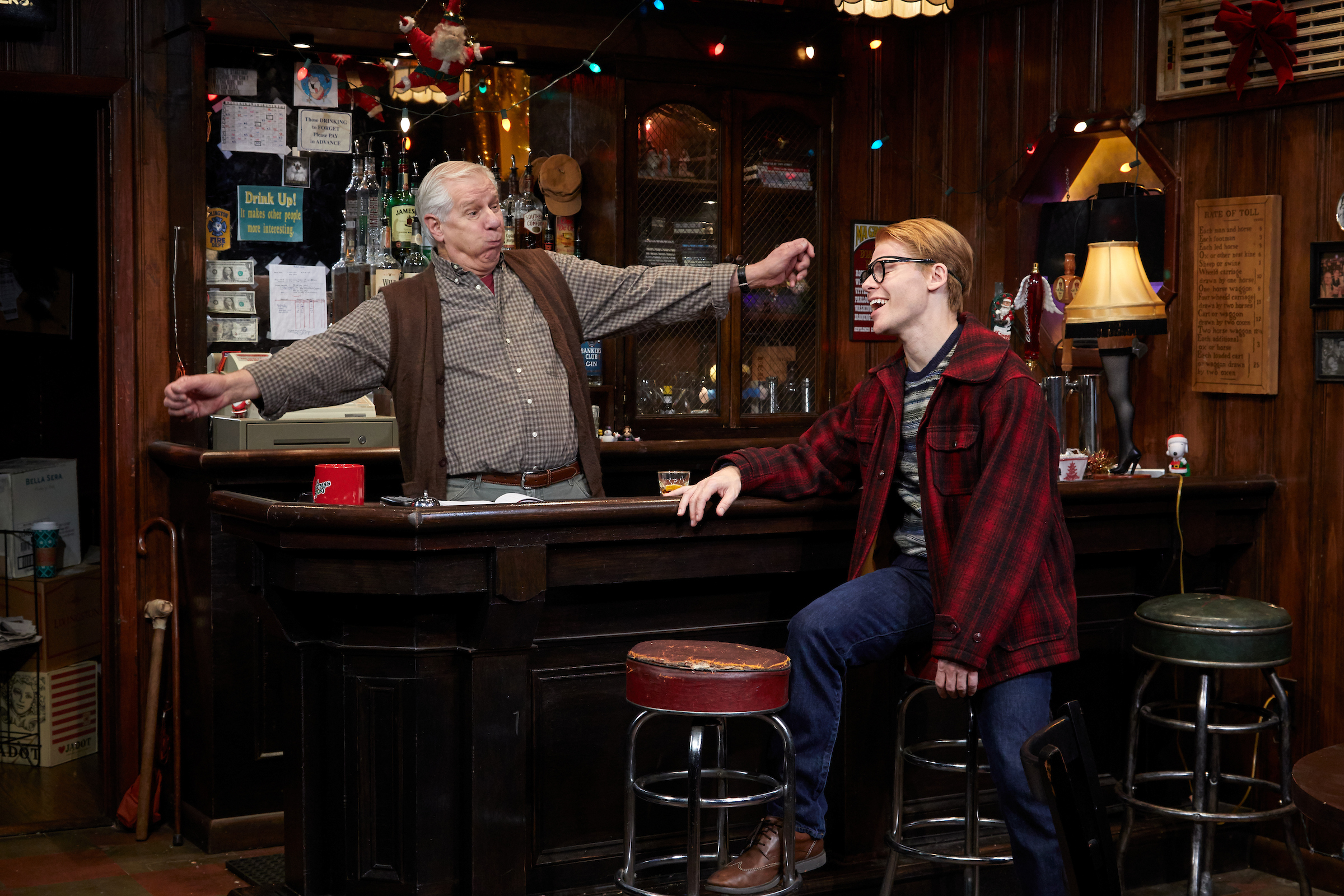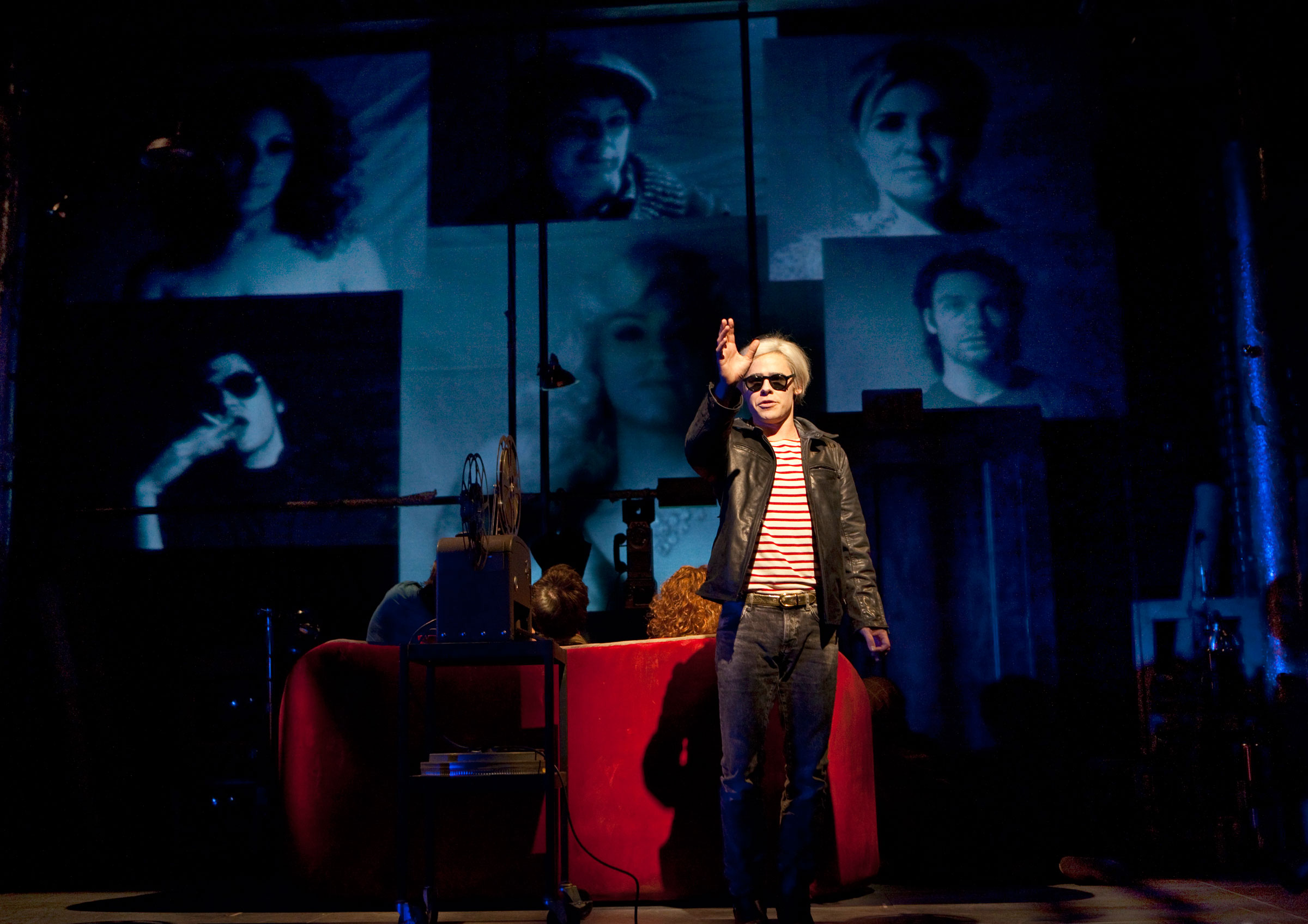Christmas on the Rocks, TheaterWorks
Merry Covid Christmas! The best meme I’ve seen on the current mood is “Don we now our plague apparel” above masks hung like stockings. Still, it is the holiday season and that means certain tried and true Christmas favorites are available in the online streaming environment.
One such is Rob Ruggiero’s durable Christmas on the Rocks at TheaterWorks. The show works because it assumes that much of the cultural glue of Yuletide, among the TV generations anyway, was provided by the Christmas perennials: the programming that the networks foist upon viewers every year when December rolls around. These are the kind of shows often called ‘beloved,’ but they can also cloy as time goes by, except, maybe, with children still experiencing their buoyant wonder for the first time.
Which is a way of saying that the tone of Christmas on the Rocks—the whole thing takes place in a bar—is for adults, particularly adults who may have soured on ersatz Christmas cheer somewhere around the turn of the millennium. So be prepared for nuttiness, desperation, depression, laughs and, through it all, the kind of warm, fuzzy values that Christmas shows foster to raise the spirits of us fellow humans.
This year, Love Boat regular Ted Lange is back as the bartender just trying to get through his Christmas eve shift, when what to his wondering eyes should appear but … Ralphie (from The Christmas Story), Zuzu (from It’s a Wonderful Life), Herbie the elf/dentist (from Rudolph the Red-Nosed Reindeer), Karen (from Frosty the Snowman), Tiny Tim (from A Christmas Carol), Clara (from The Nutcracker), and Charlie Brown (from A Charlie Brown Christmas), who is joined by a special someone. This year Jen Harris again plays all the female guests, Randy Harrison returns as Ralphie and Tiny Tim, Matthew Wilkas plays Herbie, and Harry Bouvy plays Charlie Brown.
The innovation in our distanced days is that this time Lange, who is in California, provides the voice of the Bartender while the camera gives us the latter’s POV on the evening. It’s more static than watching the play onstage, and of course we miss Lange’s non-verbal reactions, but it does make for an even stricter intimacy. We see what the camera shows us and all the visitors are perforce addressing us directly. It’s another example of TheaterWorks’ grasp of the necessary artistry of taping theater for streaming purposes.
The seven cleverly scripted scenes are written by seven playwrights, with Harris and Wilkas teaming up on Scene Four, “My Name is KAREN!”, and Jacques Lamarre authoring two: Scene Two, “It’s a Miserable Life,” and Scene Seven, “Merry Christmas, Blockhead.” The best scenes are those in which Lange has more to do verbally, so that he is actually interacting rather than just passively viewing. It’s best when he’s trying to understand the plight of his customer, as in Scene One—“All Grown Up,” by John Cariani—and Scene Two. Both of those are entertaining because Ralphie and Zuzu are seen as suffering, as grownups, from the long shadow of the heart-warming anecdotes of their childhood. It’s good stuff, in the early going, and it pulls us in.
In Scene Four, the Bartender is gagged and bound as Harris’s Karen interacts with her online fanbase. The streaming POV this year lets us be at times the online audience and at times the Bartender, seamlessly. It’s a wild and over-the-top performance, so manic that we welcome the more modulated and touching Scene Five—“God Bless Us Every One”—in which Lange comes on strong in taking Scrooge’s part against Tiny Tim’s flippant dismissal.
Watching this year, I felt that Harrison’s departure out that door, as a re-inspired Tim giving his trademark sign-off (too bad the kid didn’t copyright that saying!) would be a satisfying and resonant ending. The last two episodes—Harris’s nutty Clara and Bouvy’s dullsville Charlie Brown—tended to dampen my spirits rather than raise them. One might reflect that there’s a reason Charlie Brown never had a solo show—he’s just not funny! Granted, On the Rocks wants to end with its one romantic moment, and it’s never wrong, I guess, to aim for the “date” tie-in (not something that’s going to be a factor for me, frankly). To my mind, it might be time to shake up the formula with a different sequence of scenes. Even some versions of A Christmas Carol, after all, alter the sequence of ghosts.
In any case, ‘tis the season to seek out distractions from the sad state of affairs in our poor beleaguered country, and maybe from the same-o, same-o replays of the too-often viewed and overly familiar paeans of our snuggly past and other reassuring panaceas. In becoming a seasonal staple, Christmas on the Rocks has it both ways, drawing us in by reactivating braincells that have stored these stories for decades, and then giving us something a bit different, like when someone spikes the cookies instead of the eggnog. In the end, it wants us to believe that, even if all those folks in those fairytales didn’t live happily ever after, they can still have a good time. And give us one too, with just enough ho-ho-ho’s to make the season bright . . . or at least less dim.
Christmas on the Rocks
Conceived and Directed by Rob Ruggiero|
Written by: John Cariani, Jenn Harris & Matthew Wilkas, Jeffrey Hatcher, Jacques Lamarre, Theresa Rebeck, Edwin Sánchez
Set Design: Michael Schweikardt; Costume Design: Alejo Vietti; Lighting Design: John Lasiter; Sound Design: Michael Miceli; Wig Design: Mark Adam Rampmeyer; Stage Manager: Kate J. Cudworth
Cast: Harry Bouvy, Jenn Harris, Randy Harrison, Matthew Wilkas, And Ted Lange
TheaterWorks
Streaming December 1-31, 2020






 Pop!, the new musical now playing in its world premiere at the Yale Rep, could have been a camp classic: staging a song-and-dance extravaganza on the shooting of famed pop artist, provocateur, and blasé icon Andy Warhol at the hands of a disaffected feminist revolutionary, Valerie Solanis, in 1968. The silver Factory, Warhol’s headquarters at 231 East 47th street in NY, was famed for its stable of hangers-on, including “poor little rich girl” Edie Sedgwick, pre-op transexual Candy Darling, and other would-be geniuses. From this remove, it would be possible to play these characters for laughs, as a collective disgorging of whatever is stored in the closet marked “NYC Underground c. 1967.” Along the way, we might be amused (or not) by the fact that one of these “superstars” had the wherewithal to shoot and critically wound The Master.
Pop!, the new musical now playing in its world premiere at the Yale Rep, could have been a camp classic: staging a song-and-dance extravaganza on the shooting of famed pop artist, provocateur, and blasé icon Andy Warhol at the hands of a disaffected feminist revolutionary, Valerie Solanis, in 1968. The silver Factory, Warhol’s headquarters at 231 East 47th street in NY, was famed for its stable of hangers-on, including “poor little rich girl” Edie Sedgwick, pre-op transexual Candy Darling, and other would-be geniuses. From this remove, it would be possible to play these characters for laughs, as a collective disgorging of whatever is stored in the closet marked “NYC Underground c. 1967.” Along the way, we might be amused (or not) by the fact that one of these “superstars” had the wherewithal to shoot and critically wound The Master.